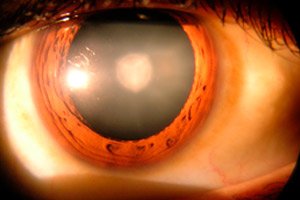
All iLive content is medically reviewed or fact checked to ensure as much factual accuracy as possible.
We have strict sourcing guidelines and only link to reputable media sites, academic research institutions and, whenever possible, medically peer reviewed studies. Note that the numbers in parentheses ([1], [2], etc.) are clickable links to these studies.
If you feel that any of our content is inaccurate, out-of-date, or otherwise questionable, please select it and press Ctrl + Enter.
A link between cataracts and dementia has been discovered
Last reviewed: 02.07.2025

Researchers at the University of Washington College of Medicine have found that people who have had cataracts removed are less likely to develop dementia, regardless of the etiology of its development. If a person continues to live with a cloudy lens, the risk of developing acquired dementia increases significantly.
Dementia is an extremely common syndrome that develops against the background of brain dysfunction. Today, the pathology is considered incurable. One of the factors in the development of persistent progressive dementia is considered to be a visual impairment, in particular, age-related cataracts. Scientists have discovered that timely restoration of vision significantly reduces the risk of developing dementia in the elderly.
The researchers carefully reviewed information about earlier studies on the topic of mental changes in adult patients. They studied the medical records of more than 3,000 patients aged 65 and over with confirmed diagnoses of glaucoma or cataracts. When the research project was launched, none of the study participants had a diagnosis of dementia.
During the long-term follow-up, more than eight hundred subjects developed various forms of dementia. Of these, seven hundred patients were diagnosed with Alzheimer's disease. Overall, 45% of all subjects underwent cataract surgery.
Further studies showed that people who had cataract surgery had a roughly 30% lower risk of developing any type of dementia - and that this risk remained stable for at least ten years.
The exact mechanism by which the link between dementia and cataracts is established is still unknown. It is believed that after the problem of poor vision was eliminated, patients were able to better sensory activity, which improved and maintained their cognitive abilities. For example, it was found that operations that did not result in improved vision (for example, antiglaucoma interventions) did not improve the risk indicators for the development of dementia.
Another hypothesis is that the surgery restored the perception of the blue color spectrum, which is usually blocked by cataracts. This spectrum, according to scientists, is used by the light-sensitive ganglion structures of the retina to regulate circadian rhythms.
The point of the surgical intervention is the following: the doctor removes the clouded lens and installs an artificial lens in its place, which completely replaces the natural organ. As a result, the patient regains all the visual abilities that were lost due to cataracts.
Further research should be aimed at improving the understanding of the relationship between age-related intraocular changes and brain function. Scientists will have to develop possible preventive and therapeutic methods to prevent, slow down or stop the development of age-related dementia.
Source of research information jamanetwork
